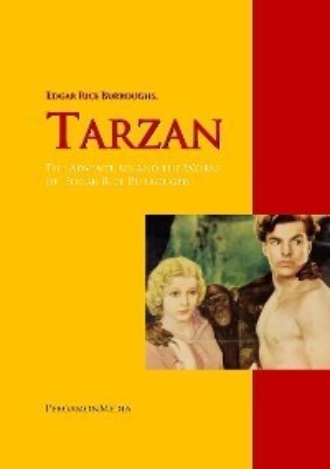
Полная версия
Tarzan: The Adventures and the Works of Edgar Rice Burroughs
And so, an hour later, Korak, The Killer, rode home to his mother—the mother whose image had never faded in his boyish heart—and found in her arms and her eyes the love and forgiveness that he plead for.
And then the mother turned toward Meriem, an expression of pitying sorrow erasing the happiness from her eyes.
"My little girl," she said, "in the midst of our happiness a great sorrow awaits you—Mr. Baynes did not survive his wound."
The expression of sorrow in Meriem's eyes expressed only what she sincerely felt; but it was not the sorrow of a woman bereft of her best beloved.
"I am sorry," she said, quite simply. "He would have done me a great wrong; but he amply atoned before he died. Once I thought that I loved him. At first it was only fascination for a type that was new to me—then it was respect for a brave man who had the moral courage to admit a sin and the physical courage to face death to right the wrong he had committed. But it was not love. I did not know what love was until I knew that Korak lived," and she turned toward The Killer with a smile.
Lady Greystoke looked quickly up into the eyes of her son—the son who one day would be Lord Greystoke. No thought of the difference in the stations of the girl and her boy entered her mind. To her Meriem was fit for a king. She only wanted to know that Jack loved the little Arab waif. The look in his eyes answered the question in her heart, and she threw her arms about them both and kissed them each a dozen times.
"Now," she cried, "I shall really have a daughter!"
It was several weary marches to the nearest mission; but they only waited at the farm a few days for rest and preparation for the great event before setting out upon the journey, and after the marriage ceremony had been performed they kept on to the coast to take passage for England. Those days were the most wonderful of Meriem's life. She had not dreamed even vaguely of the marvels that civilization held in store for her. The great ocean and the commodious steamship filled her with awe. The noise, and bustle and confusion of the English railway station frightened her.
"If there was a good-sized tree at hand," she confided to Korak, "I know that I should run to the very top of it in terror of my life."
"And make faces and throw twigs at the engine?" he laughed back.
"Poor old Numa," sighed the girl. "What will he do without us?"
"Oh, there are others to tease him, my little Mangani," assured Korak.
The Greystoke town house quite took Meriem's breath away; but when strangers were about none might guess that she had not been to the manner born.
They had been home but a week when Lord Greystoke received a message from his friend of many years, D'Arnot.
It was in the form of a letter of introduction brought by one General Armand Jacot. Lord Greystoke recalled the name, as who familiar with modern French history would not, for Jacot was in reality the Prince de Cadrenet—that intense republican who refused to use, even by courtesy, a title that had belonged to his family for four hundred years.
"There is no place for princes in a republic," he was wont to say.
Lord Greystoke received the hawk-nosed, gray mustached soldier in his library, and after a dozen words the two men had formed a mutual esteem that was to endure through life.
"I have come to you," explained General Jacot, "because our dear Admiral tells me that there is no one in all the world who is more intimately acquainted with Central Africa than you.
"Let me tell you my story from the beginning. Many years ago my little daughter was stolen, presumably by Arabs, while I was serving with the Foreign Legion in Algeria. We did all that love and money and even government resources could do to discover her; but all to no avail. Her picture was published in the leading papers of every large city in the world, yet never did we find a man or woman who ever had seen her since the day she mysteriously disappeared.
"A week since there came to me in Paris a swarthy Arab, who called himself Abdul Kamak. He said that he had found my daughter and could lead me to her. I took him at once to Admiral d'Arnot, whom I knew had traveled some in Central Africa. The man's story led the Admiral to believe that the place where the white girl the Arab supposed to be my daughter was held in captivity was not far from your African estates, and he advised that I come at once and call upon you—that you would know if such a girl were in your neighborhood."
"What proof did the Arab bring that she was your daughter?" asked Lord Greystoke.
"None," replied the other. "That is why we thought best to consult you before organizing an expedition. The fellow had only an old photograph of her on the back of which was pasted a newspaper cutting describing her and offering a reward. We feared that having found this somewhere it had aroused his cupidity and led him to believe that in some way he could obtain the reward, possibly by foisting upon us a white girl on the chance that so many years had elapsed that we would not be able to recognize an imposter as such."
"Have you the photograph with you?" asked Lord Greystoke.
The General drew an envelope from his pocket, took a yellowed photograph from it and handed it to the Englishman.
Tears dimmed the old warrior's eyes as they fell again upon the pictured features of his lost daughter.
Lord Greystoke examined the photograph for a moment. A queer expression entered his eyes. He touched a bell at his elbow, and an instant later a footman entered.
"Ask my son's wife if she will be so good as to come to the library," he directed.
The two men sat in silence. General Jacot was too well bred to show in any way the chagrin and disappointment he felt in the summary manner in which Lord Greystoke had dismissed the subject of his call. As soon as the young lady had come and he had been presented he would make his departure. A moment later Meriem entered.
Lord Greystoke and General Jacot rose and faced her. The Englishman spoke no word of introduction—he wanted to mark the effect of the first sight of the girl's face on the Frenchman, for he had a theory—a heaven-born theory that had leaped into his mind the moment his eyes had rested on the baby face of Jeanne Jacot.
General Jacot took one look at Meriem, then he turned toward Lord Greystoke.
"How long have you known it?" he asked, a trifle accusingly.
"Since you showed me that photograph a moment ago," replied the Englishman.
"It is she," said Jacot, shaking with suppressed emotion; "but she does not recognize me—of course she could not." Then he turned to Meriem. "My child," he said, "I am your—"
But she interrupted him with a quick, glad cry, as she ran toward him with outstretched arms.
"I know you! I know you!" she cried. "Oh, now I remember," and the old man folded her in his arms.
Jack Clayton and his mother were summoned, and when the story had been told them they were only glad that little Meriem had found a father and a mother.
"And really you didn't marry an Arab waif after all," said Meriem. "Isn't it fine!"
"You are fine," replied The Killer. "I married my little Meriem, and I don't care, for my part, whether she is an Arab, or just a little Tarmangani."
"She is neither, my son," said General Armand Jacot. "She is a princess in her own right."
Tarzan the Untamed
Chapter I Murder and Pillage
Hauptmann Fritz Schneider trudged wearily through the somber aisles of the dark forest. Sweat rolled down his bullet head and stood upon his heavy jowls and bull neck. His lieutenant marched beside him while Underlieutenant von Goss brought up the rear, following with a handful of askaris the tired and all but exhausted porters whom the black soldiers, following the example of their white officer, encouraged with the sharp points of bayonets and the metal-shod butts of rifles.
There were no porters within reach of Hauptmann Schneider so he vented his Prussian spleen upon the askaris nearest at hand, yet with greater circumspection since these men bore loaded rifles—and the three white men were alone with them in the heart of Africa.
Ahead of the hauptmann marched half his company, behind him the other half—thus were the dangers of the savage jungle minimized for the German captain. At the forefront of the column staggered two naked savages fastened to each other by a neck chain. These were the native guides impressed into the service of Kultur and upon their poor, bruised bodies Kultur's brand was revealed in divers cruel wounds and bruises.
Thus even in darkest Africa was the light of German civilization commencing to reflect itself upon the undeserving natives just as at the same period, the fall of 1914, it was shedding its glorious effulgence upon benighted Belgium.
It is true that the guides had led the party astray; but this is the way of most African guides. Nor did it matter that ignorance rather than evil intent had been the cause of their failure. It was enough for Hauptmann Fritz Schneider to know that he was lost in the African wilderness and that he had at hand human beings less powerful than he who could be made to suffer by torture. That he did not kill them outright was partially due to a faint hope that they might eventually prove the means of extricating him from his difficulties and partially that so long as they lived they might still be made to suffer.
The poor creatures, hoping that chance might lead them at last upon the right trail, insisted that they knew the way and so led on through a dismal forest along a winding game trail trodden deep by the feet of countless generations of the savage denizens of the jungle.
Here Tantor, the elephant, took his long way from dust wallow to water. Here Buto, the rhinoceros, blundered blindly in his solitary majesty, while by night the great cats paced silently upon their padded feet beneath the dense canopy of overreaching trees toward the broad plain beyond, where they found their best hunting.
It was at the edge of this plain which came suddenly and unexpectedly before the eyes of the guides that their sad hearts beat with renewed hope. Here the hauptmann drew a deep sigh of relief, for after days of hopeless wandering through almost impenetrable jungle the broad vista of waving grasses dotted here and there with open park like woods and in the far distance the winding line of green shrubbery that denoted a river appeared to the European a veritable heaven.
The Hun smiled in his relief, passed a cheery word with his lieutenant, and then scanned the broad plain with his field glasses. Back and forth they swept across the rolling land until at last they came to rest upon a point near the center of the landscape and close to the green-fringed contours of the river.
"We are in luck," said Schneider to his companions. "Do you see it?"
The lieutenant, who was also gazing through his own glasses, finally brought them to rest upon the same spot that had held the attention of his superior.
"Yes," he said, "an English farm. It must be Greystoke's, for there is none other in this part of British East Africa. God is with us, Herr Captain."
"We have come upon the English schweinhund long before he can have learned that his country is at war with ours," replied Schneider. "Let him be the first to feel the iron hand of Germany."
"Let us hope that he is at home," said the lieutenant, "that we may take him with us when we report to Kraut at Nairobi. It will go well indeed with Herr Hauptmann Fritz Schneider if he brings in the famous Tarzan of the Apes as a prisoner of war."
Schneider smiled and puffed out his chest. "You are right, my friend," he said, "it will go well with both of us; but I shall have to travel far to catch General Kraut before he reaches Mombasa. These English pigs with their contemptible army will make good time to the Indian Ocean."
It was in a better frame of mind that the small force set out across the open country toward the trim and well-kept farm buildings of John Clayton, Lord Greystoke; but disappointment was to be their lot since neither Tarzan of the Apes nor his son was at home.
Lady Jane, ignorant of the fact that a state of war existed between Great Britain and Germany, welcomed the officers most hospitably and gave orders through her trusted Waziri to prepare a feast for the black soldiers of the enemy.
Far to the east, Tarzan of the Apes was traveling rapidly from Nairobi toward the farm. At Nairobi he had received news of the World War that had already started, and, anticipating an immediate invasion of British East Africa by the Germans, was hurrying homeward to fetch his wife to a place of greater security. With him were a score of his ebon warriors, but far too slow for the ape-man was the progress of these trained and hardened woodsmen.
When necessity demanded, Tarzan of the Apes sloughed the thin veneer of his civilization and with it the hampering apparel that was its badge. In a moment the polished English gentleman reverted to the naked ape man.
His mate was in danger. For the time, that single thought dominated. He did not think of her as Lady Jane Greystoke, but rather as the she he had won by the might of his steel thews, and that he must hold and protect by virtue of the same offensive armament.
It was no member of the House of Lords who swung swiftly and grimly through the tangled forest or trod with untiring muscles the wide stretches of open plain—it was a great he ape filled with a single purpose that excluded all thoughts of fatigue or danger.
Little Manu, the monkey, scolding and chattering in the upper terraces of the forest, saw him pass. Long had it been since he had thus beheld the great Tarmangani naked and alone hurtling through the jungle. Bearded and gray was Manu, the monkey, and to his dim old eyes came the fire of recollection of those days when Tarzan of the Apes had ruled supreme, Lord of the Jungle, over all the myriad life that trod the matted vegetation between the boles of the great trees, or flew or swung or climbed in the leafy fastness upward to the very apex of the loftiest terraces.
And Numa, the lion, lying up for the day close beside last night's successful kill, blinked his yellow-green eyes and twitched his tawny tail as he caught the scent spoor of his ancient enemy.
Nor was Tarzan senseless to the presence of Numa or Manu or any of the many jungle beasts he passed in his rapid flight towards the west. No particle had his shallow probing of English society dulled his marvelous sense faculties. His nose had picked out the presence of Numa, the lion, even before the majestic king of beasts was aware of his passing.
He had heard noisy little Manu, and even the soft rustling of the parting shrubbery where Sheeta passed before either of these alert animals sensed his presence.
But however keen the senses of the ape-man, however swift his progress through the wild country of his adoption, however mighty the muscles that bore him, he was still mortal. Time and space placed their inexorable limits upon him; nor was there another who realized this truth more keenly than Tarzan. He chafed and fretted that he could not travel with the swiftness of thought and that the long tedious miles stretching far ahead of him must require hours and hours of tireless effort upon his part before he would swing at last from the final bough of the fringing forest into the open plain and in sight of his goal.
Days it took, even though he lay up at night for but a few hours and left to chance the finding of meat directly on his trail. If Wappi, the antelope, or Horta, the boar, chanced in his way when he was hungry, he ate, pausing but long enough to make the kill and cut himself a steak.
Then at last the long journey drew to its close and he was passing through the last stretch of heavy forest that bounded his estate upon the east, and then this was traversed and he stood upon the plain's edge looking out across his broad lands towards his home.
At the first glance his eyes narrowed and his muscles tensed. Even at that distance he could see that something was amiss. A thin spiral of smoke arose at the right of the bungalow where the barns had stood, but there were no barns there now, and from the bungalow chimney from which smoke should have arisen, there arose nothing.
Once again Tarzan of the Apes was speeding onward, this time even more swiftly than before, for he was goaded now by a nameless fear, more product of intuition than of reason. Even as the beasts, Tarzan of the Apes seemed to possess a sixth sense. Long before he reached the bungalow, he had almost pictured the scene that finally broke upon his view.
Silent and deserted was the vine-covered cottage. Smoldering embers marked the site of his great barns. Gone were the thatched huts of his sturdy retainers, empty the fields, the pastures, and corrals. Here and there vultures rose and circled above the carcasses of men and beasts.
It was with a feeling as nearly akin to terror as he ever had experienced that the ape-man finally forced himself to enter his home. The first sight that met his eyes set the red haze of hate and bloodlust across his vision, for there, crucified against the wall of the living-room, was Wasimbu, giant son of the faithful Muviro and for over a year the personal bodyguard of Lady Jane.
The overturned and shattered furniture of the room, the brown pools of dried blood upon the floor, and prints of bloody hands on walls and woodwork evidenced something of the frightfulness of the battle that had been waged within the narrow confines of the apartment. Across the baby grand piano lay the corpse of another black warrior, while before the door of Lady Jane's boudoir were the dead bodies of three more of the faithful Greystoke servants.
The door of this room was closed. With drooping shoulders and dull eyes Tarzan stood gazing dumbly at the insensate panel which hid from him what horrid secret he dared not even guess.
Slowly, with leaden feet, he moved toward the door. Gropingly his hand reached for the knob. Thus he stood for another long minute, and then with a sudden gesture he straightened his giant frame, threw back his mighty shoulders and, with fearless head held high, swung back the door and stepped across the threshold into the room which held for him the dearest memories and associations of his life. No change of expression crossed his grim and stern-set features as he strode across the room and stood beside the little couch and the inanimate form which lay face downward upon it; the still, silent thing that had pulsed with life and youth and love.
No tear dimmed the eye of the ape-man, but the God who made him alone could know the thoughts that passed through that still half-savage brain. For a long time he stood there just looking down upon the dead body, charred beyond recognition, and then he stooped and lifted it in his arms. As he turned the body over and saw how horribly death had been meted he plumbed, in that instant, the uttermost depths of grief and horror and hatred.
Nor did he require the evidence of the broken German rifle in the outer room, or the torn and blood-stained service cap upon the floor, to tell him who had been the perpetrators of this horrid and useless crime.
For a moment he had hoped against hope that the blackened corpse was not that of his mate, but when his eyes discovered and recognized the rings upon her fingers the last faint ray of hope forsook him.
In silence, in love, and in reverence he buried, in the little rose garden that had been Jane Clayton's pride and love, the poor, charred form and beside it the great black warriors who had given their lives so futilely in their mistress' protection.
At one side of the house Tarzan found other newly made graves and in these he sought final evidence of the identity of the real perpetrators of the atrocities that had been committed there in his absence.
Here he disinterred the bodies of a dozen German askaris and found upon their uniforms the insignia of the company and regiment to which they had belonged. This was enough for the ape-man. White officers had commanded these men, nor would it be a difficult task to discover who they were.
Returning to the rose garden, he stood among the Hun trampled blooms and bushes above the grave of his dead—with bowed head he stood there in a last mute farewell. As the sun sank slowly behind the towering forests of the west, he turned slowly away upon the still-distinct trail of Hauptmann Fritz Schneider and his blood-stained company.
His was the suffering of the dumb brute—mute; but though voiceless no less poignant. At first his vast sorrow numbed his other faculties of thought—his brain was overwhelmed by the calamity to such an extent that it reacted to but a single objective suggestion: She is dead! She is dead! She is dead! Again and again this phrase beat monotonously upon his brain—a dull, throbbing pain, yet mechanically his feet followed the trail of her slayer while, subconsciously, his every sense was upon the alert for the ever-present perils of the jungle.
Gradually the labor of his great grief brought forth another emotion so real, so tangible, that it seemed a companion walking at his side. It was Hate—and it brought to him a measure of solace and of comfort, for it was a sublime hate that ennobled him as it has ennobled countless thousands since—hatred for Germany and Germans. It centered about the slayer of his mate, of course; but it included everything German, animate or inanimate. As the thought took firm hold upon him he paused and raising his face to Goro, the moon, cursed with upraised hand the authors of the hideous crime that had been perpetrated in that once peaceful bungalow behind him; and he cursed their progenitors, their progeny, and all their kind the while he took silent oath to war upon them relentlessly until death overtook him.
There followed almost immediately a feeling of content, for, where before his future at best seemed but a void, now it was filled with possibilities the contemplation of which brought him, if not happiness, at least a surcease of absolute grief, for before him lay a great work that would occupy his time.
Stripped not only of all the outward symbols of civilization, Tarzan had also reverted morally and mentally to the status of the savage beast he had been reared. Never had his civilization been more than a veneer put on for the sake of her he loved because he thought it made her happier to see him thus. In reality he had always held the outward evidences of so-called culture in deep contempt. Civilization meant to Tarzan of the Apes a curtailment of freedom in all its aspects—freedom of action, freedom of thought, freedom of love, freedom of hate. Clothes he abhorred—uncomfortable, hideous, confining things that reminded him somehow of bonds securing him to the life he had seen the poor creatures of London and Paris living. Clothes were the emblems of that hypocrisy for which civilization stood—a pretense that the wearers were ashamed of what the clothes covered, of the human form made in the semblance of God. Tarzan knew how silly and pathetic the lower orders of animals appeared in the clothing of civilization, for he had seen several poor creatures thus appareled in various traveling shows in Europe, and he knew, too, how silly and pathetic man appears in them since the only men he had seen in the first twenty years of his life had been, like himself, naked savages. The ape-man had a keen admiration for a well-muscled, well-proportioned body, whether lion, or antelope, or man, and it had ever been beyond him to understand how clothes could be considered more beautiful than a clear, firm, healthy skin, or coat and trousers more graceful than the gentle curves of rounded muscles playing beneath a flexible hide.
In civilization Tarzan had found greed and selfishness and cruelty far beyond that which he had known in his familiar, savage jungle, and though civilization had given him his mate and several friends whom he loved and admired, he never had come to accept it as you and I who have known little or nothing else; so it was with a sense of relief that he now definitely abandoned it and all that it stood for, and went forth into the jungle once again stripped to his loin cloth and weapons.
The hunting knife of his father hung at his left hip, his bow and his quiver of arrows were slung across his shoulders, while around his chest over one shoulder and beneath the opposite arm was coiled the long grass rope without which Tarzan would have felt quite as naked as would you should you be suddenly thrust upon a busy highway clad only in a union suit. A heavy war spear which he sometimes carried in one hand and again slung by a thong about his neck so that it hung down his back completed his armament and his apparel. The diamond-studded locket with the pictures of his mother and father that he had worn always until he had given it as a token of his highest devotion to Jane Clayton before their marriage was missing. She always had worn it since, but it had not been upon her body when he found her slain in her boudoir, so that now his quest for vengeance included also a quest for the stolen trinket.






